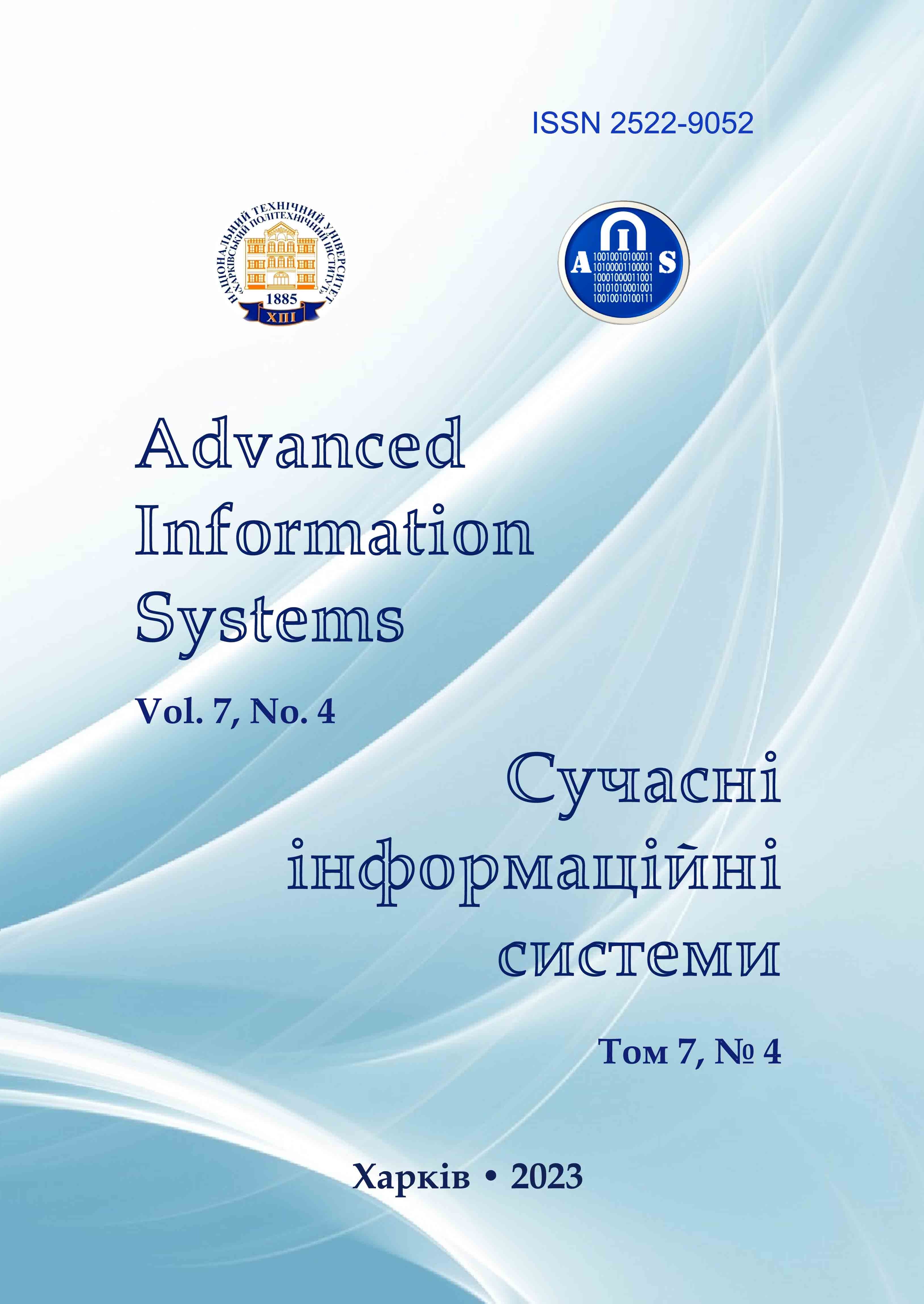ACOUSTO-OPTICAL RECEIVER OF AN OBSTRUCTION PASSIVE RADAR SYSTEM
Main Article Content
Abstract
The subject of research in the article is the passive radar system of a warship. The purpose of the work was to review the characteristics use of the acousto-optical receiver in the new passive radar system of the warship, to investigate the peculiarities of acoustooptic effect and the relevant synthesis of methods and tools for measuring the photodetector photoelectric characteristics and, in addition, to investigate the energy-and-geometric parameters of laser radiation Justification. It is shown that the transition, impulse and frequency characteristics are taken as the main means to determine the operating and technical parameters of the acousto-optical delay line. It is not possible to unambiguously extrapolate these characteristics to the known models of the characteristics of the acousto-optic radar receiver created on AODL. Research results. In the context of this postulate, mathematical models of the main characteristics of AODL were developed. On the basis of the synchronous compensation pulse obstacles applied to the passive radar acousto-optic receiver on military ships, the full compensation of the obstacles is determined for the effective reception of signals from the acousto-optic receiver. In radar stations (radar), the main attention is focused on the statistical properties of the useful signal and passive obstacles, the speed (frequency) of the signal passing through the passive obstacle and the space-time differences. The recommendations. These features are recommended to be used only in special cases where the target is outside the reflectors for informational duration, amplitude and differences between passive obstacles, obstacle silencing and signal separation. Conclusion. Applying the full attenuation of the band filter and synphase barrier organizers, whose frequency characteristics do not depend on the tuning frequency, it is possible to provide full compensation of obstacles during the effective reception of signals by the acousto-optic receiver in the passive radar system of warships based on the proposed method for high resistance to obstacles, pulse obstacle compensation.
Article Details
References
Agayev, E.A., Ahmadov, R.A., Hasanov, A.R., Hasanov, R.A., Sadikhov, M.V. and Eynullayev, V.S. (2022), “Acoustooptical Method for Measuring the Parameters of Photosensitive Materials”, Physical Bases of Instrumentation, Vol. 11, No. 3(45), pp. 56–63, doi: http://dx.doi.org/10.25210/jfop-2203-056063
Hasanov, A.H. and Hashimov, E.G.(2022), “Analysis of the effectivness of communication and automated management systems”, Modern directions of development of information and communication technologies and management tools, Abstracts of reports of the 12th Int. Scientific and Technical Conf., Vol. 1: Section 1-4, Baku-Kharkiv-Zhylina, pp. 32–33.
Hasanov, A., Hasanov, R., Rustamov, A., Agayev, E., Eynullayev, V., Ahmadov, R. and Sadikhov, M. (2022), “Development of an axonometric model of photoelastic interaction in an acousto-optic delay line and its approbation”, Technological audit and production reserves, No. 5/2(67), pp. 38–45, doi: https://doi.org/10.15587/2706-5448.2022.267782
Wang, H., Zhang, S., Zou, X., Zhang, Y. and Liu, Y.(2017), “Self-referenced electrical method for measuring frequency response of high-speed Mach-Zehnder modulators based on two-tone modulation”, Semiconductor Lasers and Applications VII, SPIE, Beijing, China, pp. 92-97, doi: https://doi.org/10.1117/12.2247663
Boltar, K.O., Bourlakov I.D., Golovin S.V., Lognikov V.E., Mansvetov N.G. L(2000), “WIR heterodyne HgCdTe detectors //16th International Conference on Photoelectronics and Night Vision Devices”, SPIE.DL, Vol. 4340, pp. 81–84, doi: https://doi.org/10.1117/12.407711
Lozhnikov, V.E. and Dirochka, A.I. (2016), “Modulation method for measuring the parameters of a photoreceiving device at a wavelength of 10.6 μm in a heterodyne mode”, Applied Physics, Vol. 3, pp. 51–57, available at: https://applphys.orion-ir.ru/appl-16/16-3/PF-16-3-51.pdf
Islamov, I.J., Mammadov, E.A., Rustamov, A.R., Hashimov, K.K. and Nabiyev, H.S. (2023), “Simulation of an Antenna Device with Frequency Scanning”, Towards Industry 5.0, ISPR 2022, Lecture Notes in Mechanical Engineering. Springer, Cham, doi: https://doi.org/10.1007/978-3-031-24457-5_46
Gasanov, A.R., Gasanov, R.A., Rustamov, A.R., Akhmedov, R.A. and Sadykhov, M.V. (2022), “Acoustooptic Methods and Tools for Measuring Parameters of Optoelectronic devices”, Radioelectronics and Communications Systems, Vol. 65, No. 6, doi: https://doi.org/10.3103/S0735272722060048
Zotov, K.V., Bazarov, T.O., Fedorov, V.V., Savichev, I.A., Korolkov, A.E., Mukhankov, D.M., Konyashkin, A.V. and Ryabushkin, O.A. (2019), “Matrix of piezoelectric resonators for registration of spatial distribution of laser radiation”, Proc. SPIE 11028 Optical Sensors, Vol. 11028, doi: https://doi.org/10.1117/12.2521562
Agatsuma, K., Friedrich, D., Ballmer, S., DeSalvo, G., Sakata, S., Nishida, E. and Kawamura, S. (2014), “Precise measurement of laser power using an optomechanical system,” Optics Express, Vol. 22, Issue 2, pp. 2013–2030, DOI: https://doi.org/10.1364/OE.22.002013
Hasanov, A.R., Hasanov, R.A, Rustamov, A.R., Ahmadov, R.A., and Sadikhov, M.V. (2021), “Using the features of the photo elastic effect to measure the parameters of optoelectronic devices”, Success in applied physics, Vol. 9(5), pp. 430–441, doi: https://doi.org/10.51368/2307-4469-2021-9-5-430-441
Lazov, L. and Karadzhov, T. (2021), “Methods for measuring laser power”, Environment. Technology. Resources, Proceedings of the 13th International Scientific and Practical Conference. Rezekne, Latvia, Vol. 3, pp. 173–180, doi: https://doi.org/10.17770/etr2021vol3.6565
Ibrаhimov, B.G., Namazov, M.B. and Quliev, M.N. (2020), “Analysis performance indicators network multiservice infrastructure using innovative technologies”, Proceedings of the 7-th International Conference on Control and Optimization with Industrial Applications (COIA-20), Vol. II, pp.176–178.
Kovalenko, A., Kuchuk, H., Kuchuk, N. and Kostolny, J. (2021), “Horizontal scaling method for a hyperconverged network”, 2021 International Conference on Information and Digital Technologies. (IDT), Zilina, Slovakia, doi: https://doi.org/10.1109/IDT52577.2021.9497534
Serkov, A., Breslavets, V., Breslavets, J. and Yakovenko, I. (2023), “The influence of a potential barrier on the mechanisms of excitation of own fluctuations in radio products in conditions of exposure to electromagnetic radiation”, Advanced Information Systems, Vol. 7, No. 1, pp. 36–40, doi: https://doi.org/10.20998/2522-9052.2023.1.06
Hasanov, A.R., Hasanov, R.A, Rustamov, A.R., Ahmadov, R.A., Suleymanov, I.I. and Sadikhov. M.V.(2022), “Acousto-optic spectral-time analyzer”, Applied Physics, Vol. 2(1), URL: https://applphys.orion-ir.ru/appl-22/22-2/PF-22-2-62_RU.pdf
Ibrаhimov, B.G., Hashimov, E.G., Hasanov, A.H. and Talıbov, A.M. (2022), “Research and analysis indicators fiber-optic communication lines using spectral technologies”, Advanced Information Systems, Vol. 6, No. 1, pp. 61–64, doi: https://doi.org/10.20998/2522-9052.2022.1.10.
